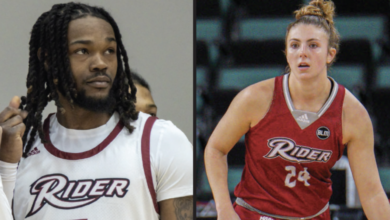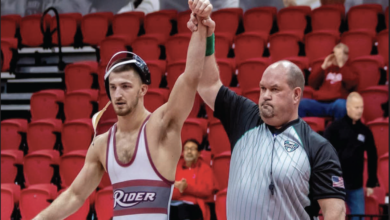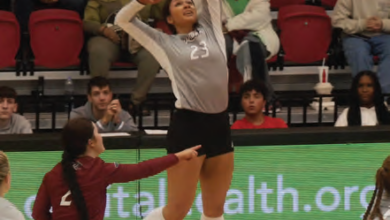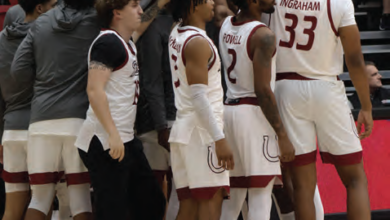
Kevin Baggett opens up about social justice
By Shaun Chornobroff and Dylan Manfre
It was not long ago that Kevin Baggett was driving home from Alumni Gym around 10 p.m. after a routine day at work.
He wasn’t speeding. He wasn’t swerving. It was just a typical 25-minute drive to his home in Burlington, New Jersey.
Then, he experienced something that incites fear into the hearts of Black people in America.
Getting pulled over.
“I was uncomfortable, and I knew the officer was kind of picking at me a little bit, so I just said ‘Would you mind if I record this?’” Baggett recalled.
Frequently, events have shown, getting pulled over is anything but safe for Black people.
He has lived most of his 54 years in fear simply because he is a Black man in America. After Trayvon Martin was shot and killed wearing a hooded sweatshirt in 2012, Baggett is now “a little fearful to be running with a hood on because somebody might perceive it a little different.”
Even now in 2020, with the coronavirus gripping the nation and forcing people to wear masks, he rhetorically asked “now with COVID[-19] everybody has masks on, can you imagine just a year ago if somebody had a mask on and walked into a bank? I mean everybody would be up in arms, especially if a black person would have something on,”
Baggett, who is Rider’s first Black men’s basketball coach, is more than just the coach. He’s a son, husband and most importantly a father. And in these difficult times, Baggett openly fears for his kids and their future.
Not too long after George Floyd’s death in May, Baggett listened to Marvin Gaye’s song “What’s Going On” from 1971 and recalled the lyrics “Mother, mother, there’s too many of you crying.”
The next two lines read “Brother, brother, brother, there’s too many of you dying.”
“That was written back in [1971] and if you listen to that song … it’s the same things that were going on back in the 60s as it is now,” Baggett said. “The police brutality, the water hosing, the dogs, the dog attacks, being beaten by blackjacks — whatever they called them back in the day — those things. That’s my biggest fear. And then my fears for my family. My fears for my kids. Will they see a different world? That we’ve gotten better? That we’ve taken steps? Will they see a drastic change? Because they’re going to have kids, and I’m going to have grandkids.”
Baggett has a son and a daughter who are 22 and 30, respectively. Despite their age, he still has open conversations with them about how to behave in front of the police.
“We talk about when you get pulled over, make sure you keep both hands on the steering wheel until the officer comes up to the window, and when they do ask for your license and your registration that if it’s in your bag or your pocketbook or your glove compartment that, before you move your hands you ask if you can reach into your glove compartment or go into your pocketbook or your bag in order for you to provide them with whatever it is that they need,” Baggett said. “We also talk about the inequality of being Black because we have to work harder. I talk to my kids about when they apply for jobs, the last name of ‘Baggett.’ There’s racial bias in reading resumes. If it sounds like a Black person compared to a white person’s resume, there’s a chance that more often than not, our resumes won’t be reviewed. We won’t have opportunities to get those jobs.”
When the world first saw the video of the moments leading up to Floyd’s death, universal protests erupted at a magnitude never before seen.
“I call it ‘the perfect storm,’” Baggett said. “We were in a COVID [-19] situation where people were really stricken to their homes and for this to come out at that time — I always believe in a higher being and in God, and I believe that God puts things out there for us all to pay attention to — I think all of this was the perfect time with the COVID [-19] going on, with this video being taken and it just gave America a chance to see really what’s going on.”
Baggett has hope that equality can be achieved, and is taking a public stance despite his perpetual daily fears. In the aftermath of Floyd’s death, Baggett released a statement on Twitter and Instagram on June 3.
“As many people know, I am not a frequent user of social media, however, these past few weeks have been extremely difficult to process — not only as a coach, but as a Black man, husband, father, son and friend,” Baggett’s statement read. “I have used this time to stand in solidarity with my players, staff, and community, and give them a safe place to process their feelings. I will continue to do the work needed to make sure they feel heard. To my broader community, action provokes change, and we need your help to make that change.”
Baggett and his coaching staff banded together with women’s basketball Assistant Coach Marritta Gillcrease and had Zoom calls with each of Rider’s coaching staffs from the other sports to express how they are feeling about the civil unrest in the country.
Due to scheduling conflicts, they were unable to meet with the coaches of the baseball team, however they still plan for the meeting to take place in the future. Baggett said these productive conversations brought them together as an athletic department.
“We shared some videos of different things with the different sports teams and I thought it was great,” Baggett said. “I thought our athletes had a lot of great things to say, white, Black, Hispanic, whatever nationality, it impacted everybody, these are uncomfortable conversations that people wouldn’t have had or are scared to have that I was willing to take that lead not only here at Rider but in the athletic department.”
The Metro Atlantic Athletic Conference (MAAC) announced its United for Justice campaign on Aug. 20, which laid out various initiatives that the league will be taking to promote the Black Lives Matter movement. This includes patches that the coaches and players will wear, as well as hardwood details for the basketball court. The MAAC will also provide “digital board content,” according to a news release by the league.
MAAC teams “will be encouraged to participate in Martin Luther King Jr. Day programming to celebrate his legacy and commitment to social change.” Baggett, who took a lead on the initiative, said he is hoping to play a game on the holiday.
Baggett has been a part of conversations about race on campus, and has been pleased with university President Gregory Dell’omo’s actions.
Baggett commended Dell’omo and his wife for attending Zoom meetings that Executive Director of the Center for Diversity and Inclusion Pamela Pruitt and her staff put together to allow students to speak out about their experiences with race at Rider.
“I thought President Dell’omo did an unbelievable job of really stepping up and getting out in front of it and admitting the fact that we have a long way to go, but he was able to take this on and not take it [lightly] and take it seriously.”
The university’s decision to create the position of a chief diversity officer is something Baggett is especially proud of. Baggett, who is Rider’s first black men’s basketball coach, is representing athletics as a part of the diverse committee in charge of presenting Dell’omo with formulating responsibilities for the chief diversity officer.
“This is a big step when people hire chief diversity officers on campus. That person is going to be in charge of a lot in terms of retention, making sure that there’s the right amount of representation for all ethnic groups, making sure that there’s promotional opportunities for minorities,” Baggett said.
Baggett said the chief diversity officer will also serve in the president’s cabinet.
Baggett wants this to be a catalyst for change and equality, and openly fears that this may just be a moment, which he is trying to use his platform to prevent. He is hoping that this country becomes something he briefly knew, a country unified in the wake of the Sept. 11 terrorist attacks.
“You guys were probably young when 9/11 happened,” Baggett said. “I remember there was a time when they would play that song, “It’s Great to be an American” [God Bless the USA by Lee Greenwood] and we were all proud because that was a time where we all had to come together because there was another country going against us. Our country was united for a little while then, but it’s just like anything else as time goes on we started to separate again. At that time, it was a great feeling because people knew we needed to come together. Well here we are now, can we do that not only for now, but going forward, so this doesn’t become just a moment, but a movement.”
Baggett reiterated that the biggest thing that can be done is to educate and keep an open dialogue.
“Educate white people, educate Black people that are young people and don’t understand. The more we can communicate and talk and the more that we can listen and not just talk at people, but that we listen,” Baggett said. “We still won’t agree on everything, but to understand that there’s common ground for us both and that to me is always going to be equality.”



